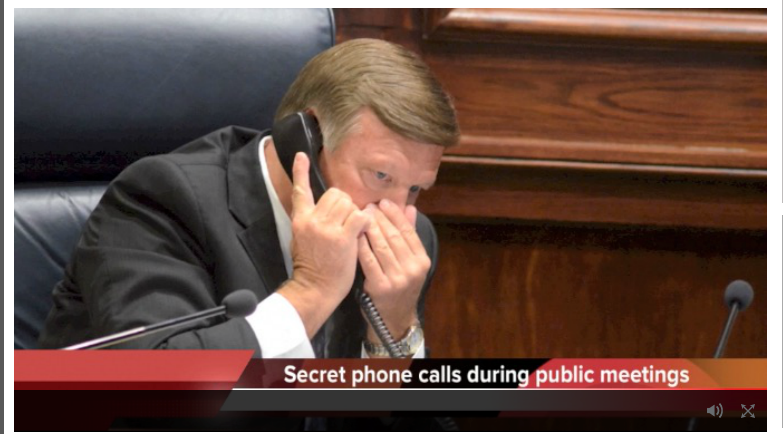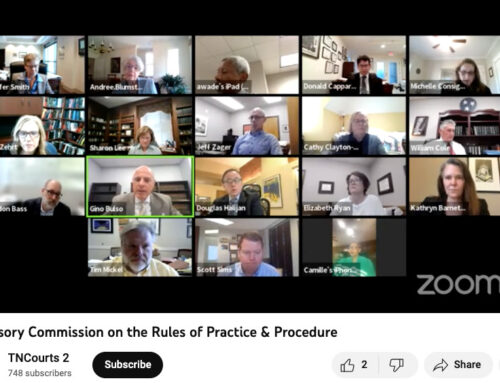Hamilton County commissioners use phones to have secret conversations during public meetings
The Chattanooga Times Free Press reported over the holidays an interesting story about Hamilton County commissioners, some of whom call each other using the phones on the dais to have secret conversations during public meetings.
News reporter Louie Brogdon, who covers the county commission, reported that the phone calls between county commissioners occur about once or twice a meeting.
Brogdon called Tennessee Coalition for Open Government for comment, and frankly I was surprised at what he described. I hear many complaints about members of governing bodies having secret conversations about matters before the body, but most often this is not during a public meeting and so visible. A violation of the Sunshine Act occurs when members of a governing body deliberate on an issue in secret, and the phone conversations — depending on what is said — certainly could qualify as secret because members of the public would not be able to hear. The Times Free Press even published a photo showing how the commissioners shield the telephone conversation from the microphone.
It reminded me of a complaint I heard from a reporter in Maury County who said members of a governing body texted each other during meetings. (Unlike the phone calls, texting can leave a record, and I suggested making a public records requests for the texts to see what was said.)
Brogdon said the practice in Hamilton County has been ongoing for years, and one Hamilton County commissioner even notes to Brogdon that he understands how it can appear to the public because he remembers seeing it before he became a commissioner.
Clearly, this is an issue we will continue to monitor.
Here is a link to the Times Free Press story, and an excerpt:
…Here in Hamilton County, commissioners typically speak in clear voices and hold their meetings in plain view for the public — except when they call each other with phones at the dais.
It happens once or twice a meeting. A commissioner will have the floor, discussing a budget item or a need in his or her district. Meanwhile another commissioner will pick up the phone. A second later another will answer. Once the conversation is over, both hang up and rejoin the debate. No one in the room can know what they discussed — whether it’s Monday Night Football or how much money to spend on schools.
Deborah Fisher, executive director of the Tennessee Coalition for Open Government, said that, to her knowledge, this practice is unique to Hamilton County. And it likely needs to change.
“Unless they are just talking about last night’s basketball game, it sounds to me like they are deliberating about an issue at hand, and that would be a violation of the Open Meetings Act if people can’t hear,” she said.
State law says that “the formation of public policy and decisions is public business and shall not be conducted in secret.”
To that end, the state’s open records lawyer has said that means whispering in a public meeting or using a phone to keep the public from hearing is a no-no.
Former Open Records Counsel Elisha Hodge said so when she wrote a letter to the IDB in Greene County.
“It is the opinion of this office … that all public meetings of a governing body are required to be held in a manner that permits the public to hear the issues being deliberated and/or the decisions being made,” Hodge wrote.
Hamilton County Commission Chairman Jim Fields, an attorney, said he’s not aware of any internal rules about how commissioners use the phones and said he would defer to the county attorney to comment on them. But he didn’t recall any commissioner ever calling him to discuss a vote on the floor.
“Sometimes there are comments but nothing about deliberating on issues,” he said. “I’ve had a call before saying, ‘Maybe we should ask this question.’ And then the question gets asked. I can’t think of any example of any deliberating.”
County Attorney Rheubin Taylor said he’s also not aware of any commission-imposed rules, but “at no time can anyone violate the Sunshine Law.”
But the phone calls aren’t being recorded, and there’s no way to definitively tell what commissioners are talking about.
“They know not to deliberate toward a decision. Now as to what they actually say, no one knows but the parties involved,” Taylor said.
Commissioners Tim Boyd, Chester Bankston, Marty Haynes and Joe Graham all said they didn’t use the phones often. And all said when they did, it wasn’t to debate.
“I’ve used the phone to say, ‘Hey, where are we going to lunch today,'” Graham said. “Do we deliberate on votes? No, because we are right there debating issues. But it is a good point to bring up. I’d never thought of it in relation to the Sunshine Law.”
But Haynes said he knows it can look suspicious to an observer.
“Having been an audience member in the past, I can remember seeing that,” Haynes said.





